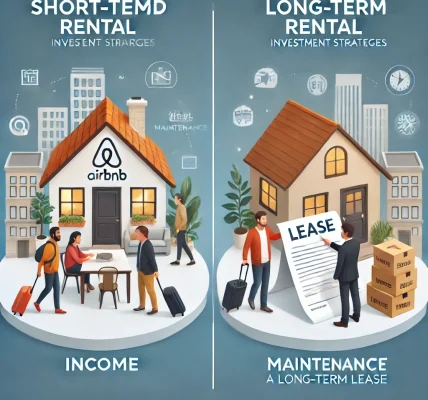The Best Financing Options for Real Estate Investors in 2025: How Technology is Changing Real Estate Investments
Introduction
The real estate market is evolving rapidly, and with 2025 already here, investors need to stay ahead of the curve. One of the most crucial aspects of real estate investment is financing, and thanks to technology, new and innovative funding options have emerged. Whether you are a seasoned investor or a beginner, understanding the best financing methods and how technology is reshaping the industry will help you make informed decisions. This guide explores the best financing options available in 2025 and highlights how technology is changing the landscape of real estate investments.
1. Traditional Financing Methods Still Relevant in 2025
1.1. Conventional Loans
Conventional loans remain a go-to financing option for real estate investors due to their stability and relatively low-interest rates. To secure a conventional loan, investors typically need a strong credit score, a solid financial history, and a down payment of at least 20%.
1.2. Government-Backed Loans
For those who qualify, government-backed loans such as FHA loans, VA loans, and USDA loans continue to be attractive options. These loans generally offer lower down payments and more flexible qualification requirements.
1.3. Hard Money Loans
Hard money loans, offered by private lenders, are ideal for investors looking for quick financing with fewer credit restrictions. However, these loans come with higher interest rates and shorter repayment terms.
1.4. Seller Financing
In this arrangement, the property seller acts as the lender, allowing the buyer to make direct payments over time. This method can be beneficial for both parties, offering flexible terms and bypassing traditional lenders.
2. Emerging Financing Options in 2025
2.1. Crowdfunding for Real Estate
With platforms like Fundrise, RealtyMogul, and CrowdStreet, crowdfunding has become a popular alternative to traditional loans. Investors can pool their money together to fund real estate projects with relatively small initial investments.
2.2. Blockchain-Based Financing
Blockchain technology has introduced new ways of securing financing through tokenization and decentralized lending. Smart contracts allow investors to receive funds securely and transparently without intermediaries.
2.3. FinTech and Peer-to-Peer (P2P) Lending
FinTech companies are revolutionizing real estate financing by offering P2P lending solutions. Platforms such as Prosper and LendingClub enable investors to obtain loans directly from individual lenders at competitive rates.
2.4. Rent-to-Own Programs
For investors who may not qualify for traditional financing, rent-to-own programs provide an opportunity to lease properties with an option to purchase later. This method allows investors to generate rental income while securing a future purchase.
3. How Technology is Transforming Real Estate Investments
3.1. Artificial Intelligence (AI) in Risk Assessment
AI-powered tools analyze vast amounts of data to assess property risks, market trends, and potential ROI. This enables investors to make data-driven decisions with higher accuracy.
3.2. Big Data and Predictive Analytics
Predictive analytics uses historical and real-time data to forecast property values, rental demand, and investment opportunities. Platforms like Zillow and Redfin leverage big data to provide market insights.
3.3. Virtual and Augmented Reality (VR & AR)
VR and AR allow investors to conduct virtual property tours, reducing the need for in-person visits. This technology also enhances marketing strategies, attracting potential buyers and tenants.
3.4. Smart Contracts and Secure Transactions
Blockchain-based smart contracts eliminate the need for middlemen, ensuring secure and transparent transactions. This reduces fraud risks and speeds up property transfers.
3.5. Automated Property Management
Technology-driven property management tools automate tasks such as rent collection, maintenance requests, and tenant screening, making property management more efficient.
4. Step-by-Step DIY Guide to Securing Real Estate Financing
Step 1: Assess Your Financial Health
- Check your credit score and improve it if needed.
- Review your income, assets, and existing debts.
- Determine how much capital you need.
Step 2: Research Financing Options
- Compare interest rates and loan terms.
- Explore traditional and alternative financing methods.
- Consider technology-driven funding solutions.
Step 3: Prepare Necessary Documentation
- Gather financial statements, tax returns, and proof of income.
- Organize property appraisals and investment plans.
- Ensure compliance with legal and lender requirements.
Step 4: Apply for Financing
- Submit loan applications to banks, online lenders, or crowdfunding platforms.
- Work with real estate professionals for guidance.
- Negotiate terms and finalize agreements.
Step 5: Invest Wisely
- Use predictive analytics and AI-driven tools to evaluate investment opportunities.
- Leverage digital platforms to streamline property acquisition.
- Implement smart property management solutions for efficiency.
Conclusion
Real estate financing in 2025 offers a mix of traditional and innovative options, giving investors more flexibility and opportunities. With the rapid integration of technology, securing funds and managing investments has become more accessible and efficient. Whether you choose conventional loans, crowdfunding, or blockchain-based financing, staying informed about the latest trends and tools will help you maximize your investment potential.




